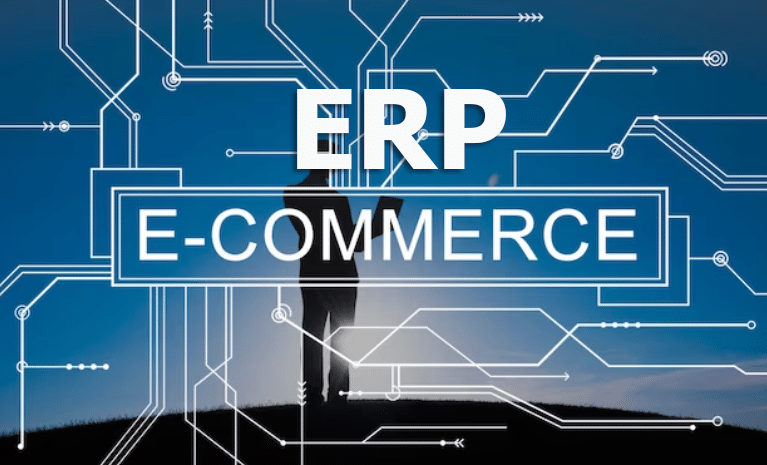ERP, which stands for Enterprise Resource Planning, is a comprehensive software system designed to streamline and manage various business processes and operations within the realm of e-commerce. In e-commerce, ERP plays a critical role in integrating and centralizing key functions, facilitating efficient communication and data exchange between different departments within an organization. This integrated approach is particularly important for businesses in the e-commerce sector, as it allows for real-time decision-making and data synchronization across the entire enterprise.
In simpler terms, ERP in e-commerce is a sophisticated software solution that harmonizes and optimizes essential functions, such as inventory management, order processing, financials, and customer interactions, ultimately contributing to more efficient and effective operations in the dynamic and competitive world of online commerce.

ERP Ecommerce: Streamlining Operations and Boosting Customer Satisfaction
In the fast-paced world of e-commerce, businesses are continually seeking ways to optimize their operations and enhance customer satisfaction. One such solution that has gained prominence in recent years is Enterprise Resource Planning (ERP). In this article, we will explore the role of ERP in e-commerce and its numerous benefits.
Introduction to ERP in Ecommerce
Enterprise Resource Planning (ERP) is a comprehensive software solution that integrates various business processes and functions into a unified system. In e-commerce, ERP systems have become a vital tool for managing various operations efficiently. ERP streamlines core processes, such as inventory management, order processing, and financials, enabling businesses to operate seamlessly.
The Role of ERP in Ecommerce
ERP plays a pivotal role in e-commerce by offering a centralized platform that connects different departments, including sales, finance, marketing, and supply chain management. This interconnected approach ensures real-time data sharing and decision-making across the organization.
Benefits of ERP for Ecommerce Businesses
- Efficiency and Productivity: ERP automates time-consuming tasks, reducing manual errors and improving overall efficiency.
- Data Accuracy: Accurate data leads to better decision-making and helps businesses serve their customers more effectively.
- Cost Reduction: ERP helps cut operational costs through better resource allocation and inventory management.
- Scalability: E-commerce businesses can grow without worrying about system limitations.
- Competitive Advantage: The ability to respond quickly to market changes gives an edge in the competitive e-commerce landscape.
Key Features of ERP in Ecommerce
ERP solutions for e-commerce include features like order management, customer relationship management (CRM), inventory management, and reporting tools. These features help businesses manage their operations, track customer interactions, optimize stock levels, and gain insights into their performance.
Integration with Ecommerce Platforms
ERP systems are designed to integrate seamlessly with popular e-commerce platforms like Shopify, WooCommerce, Magento, and more. This integration ensures that your online store and back-end processes work harmoniously.
Streamlining Operations with ERP
Efficient inventory management, order processing, and seamless communication between departments result in a streamlined operation. This efficiency is essential to meet customer expectations in the e-commerce industry, where prompt deliveries and smooth transactions are crucial.
Enhancing Customer Experience
ERP empowers e-commerce businesses to deliver exceptional customer service. With access to real-time data, customer interactions can be more personalized, and issues can be resolved quickly. This improves customer satisfaction and fosters brand loyalty.
Data Management and Analysis
ERP systems collect and store data from various touchpoints within the e-commerce business. This data can be analyzed to identify trends, customer preferences, and areas for improvement. Data-driven decisions are essential for success in e-commerce.
ERP Implementation Challenges
While ERP offers numerous advantages, its implementation can be challenging. Common issues include resistance to change, data migration, and the need for thorough training. Overcoming these challenges is critical for a successful ERP integration.
Choosing the Right ERP Solution
Selecting the right ERP solution is a critical decision. Factors to consider include the scalability of the ERP system, industry-specific features, integration capabilities, and vendor support.
Case Studies: Successful ERP Integration in E-commerce
To illustrate the benefits of ERP in e-commerce, here are two real-world case studies of businesses that achieved remarkable success after implementing ERP solutions.
- Case Study 1: E-Store X: Increased order fulfillment efficiency by 40% and improved customer satisfaction through real-time order tracking.
- Case Study 2: Fashion Retailer Y: Reduced excess inventory costs by 20% by optimizing inventory management.
Future Trends in ERP for E-commerce
The e-commerce landscape is continually evolving, and so is ERP technology. Future trends include AI-driven automation, enhanced analytics, and deeper integration with emerging technologies like blockchain and the Internet of Things.
Conclusion
In conclusion, ERP is a game-changer for e-commerce businesses. It streamlines operations, boosts customer satisfaction, and provides a competitive edge in a fast-paced industry. Implementing the right ERP solution and overcoming implementation challenges is key to reaping its benefits.
FAQ Section
- Q1: What is ERP in e-commerce? ERP, or Enterprise Resource Planning, in e-commerce is a comprehensive software solution that integrates various business processes and functions into a unified system, streamlining operations and enhancing efficiency.
- Q2: How can ERP benefit e-commerce businesses? ERP benefits e-commerce businesses by improving efficiency, data accuracy, cost reduction, scalability, and providing a competitive advantage.
- Q3: What are some common challenges in implementing ERP for e-commerce? Common challenges in ERP implementation include resistance to change, data migration, and the need for thorough training.
- Q4: How do I choose the right ERP solution for my e-commerce business? Choosing the right ERP solution involves considering scalability, industry-specific features, integration capabilities, and vendor support.
- Q5: What are the future trends in ERP for e-commerce? Future trends in ERP for e-commerce include AI-driven automation, enhanced analytics, and deeper integration with emerging technologies like blockchain and the Internet of Things.